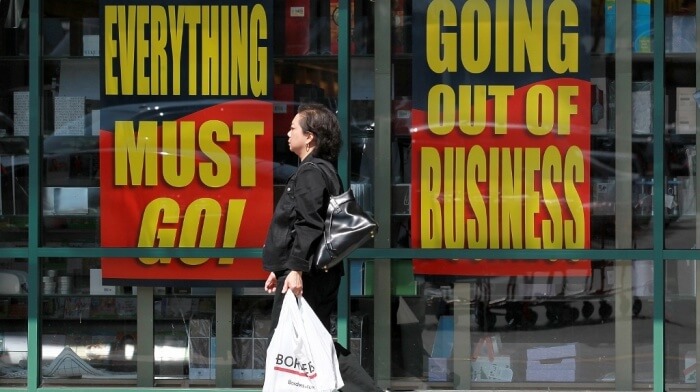Can you recession proof your business? James Poyser, co-founder of inniAccounts, says you can - especially if you create a business plan capable of taking a few almighty knocks.
How To Recession Proof Your Business
Can you recession proof your business? James Poyser, co-founder of inniAccounts, says you can - especially if you create a business plan capable of taking a few almighty knocks.

‘Economist are predicting that Britain will be in the grips of a recession…’ They are horrible words to wake up to when you run your own business. The kind that make you want to slam the alarm clock into silence at 6 in the morning.
In fact, I think that recession, regulation and renegades – those intent on disrupting your market - are probably the three words you can fear most. They can alter your course and undermine your plan to succeed.
That’s why I believe that all the time you are looking at the horizon, keeping your plan on track and scanning for new opportunities you have to have eyes in the back of your head monitoring for the factors that can take the wind from your sails.
Regulation and red tape are biggies. There to stop the corporate giants sidestepping legislation yet ensnaring small businesses and pushing them over hurdles that tie up money and resource unnecessarily.
Renegades are a mixed blessing. To my mind, competition is healthy, it helps to swell the sea, gives customers more choice and helps them to more clearly assess good value versus great value. But if you allow new entrants to be a distraction they can quickly erode market share.
Both of these ‘Rs’ are things that you can be pragmatic about. If you know your industry well you can anticipate the government’s moves and do something about it – after all regulation isn’t just switched on over night. What’s more if you know your industry inside out then you’ll know where there’s a gap in the market, and let’s face it, if it’s staring you in the face then it’s only a matter of time before it will get filled by a competitor.
Recession on the other hand is a monster. You have no idea when its grip will soften and you are at the mercy of the economists. Having said that though, I’d bet that more companies go out of business because they fail to react to renegades and regulation, than because of an economic downturn.
"Good relationships are built on a mutual recognition of the benefits they bring"
If you think about it, recessions are predictable in that there are sectors that are always hit hard. We know that retail, luxury goods, tourism, freelancers are sensitive.
So weathering recessions comes down to getting things right in advance – ultimately it’s about how well your business model performs in the eye of the storm.
Put the customer first and build a business for the long term
The businesses that do the best in the long term are those that deliver goods and services built around the needs of customers, and have a foundation of long-term and loyal relationships.
If you become obsessed with promotions and short-term profits then you will always damage your propensity to grow loyal customers. Aside from consuming a huge amount of energy to execute marketing for sales promotions, it's also a risky strategy should you find yourself competing in a recession. Think about it. If you have to discount to compete when times are good then what happens when people are squeezed?
For what it’s worth, I'm not dismissing sales-oriented businesses entirely. There are plenty out there who do well, but they go into it with their eyes open. They build discounts into their business model. They view it as a strategic marketing tool, not a tactical lever to pull when times are tough.
Less informed businesses get sucked into discounts and promotions, and find it's addictive. Unfortunately it’s at this point that the quick ‘bang for your buck’ only leaves you with a business that goes bang. You implode because it’s simply not sustainable.
Re-examine your business model
So if long term survival comes down to your business model, you need to make sure it delivers what your customers want, that it’s profitable and it offers protection from future external changes – the renegades and regulation. It should be malleable to the economic environment.
You must check it regularly, and ask yourself a set of questions that test it against the customer needs, financial interventions and competition. Generally this should be the list:
Customers: Am I still delivering what customers actually want, or just what I want to deliver / what I have always supplied? Is there a gap? If there is, why has this gap emerged? Am I building loyalty with my customers? Do they speak highly of our product/service? If not, why not? Who are they loyal to?
Financials: Is my target market sensitive to interest rate changes? Is my product/service an essential or a luxury? Is that a truism or a perception? Am I overly dependent on a declining industry?
Competitors: Are trends / tastes / needs changing? Will I be impacted positively? If not, how can I change so that I am? How easy is it for competitors to deliver a better service/product at a lower cost?
When we set up inniAccounts our goal was to help small businesses and freelancers. But the freelance market can be a barometer of how well the economy is doing so we knew we’d be sensitive to recessions and any red-tape that came along.
So before we acquired our first client we worked on a model that could withstand shock, and we still test it today against the questions above. As a result:
- We can scale up very quickly whilst delivering exceptional service as client numbers increase, so we don't have excess capacity & cost.
- We seek diversity in our client base, to ensure we're not overly dependent on one market.
- We regularly scan the environment to understand the impact of legislation changes, and react accordingly. For example, we're tackling pension red-tape by training our workforce to advise clients, and we're bringing bureaucracy cutting features into our service offering.
But there is one question that we asked more than any other in the early days and I highly recommend new business leaders ask it of themselves: are we underselling ourselves?
Rather than pricing bottom up, that’s cost plus margin, think about the value you bring to customers. Are you pricing to capture as much value as you can? When times are good are you taking the opportunity to give yourself some headroom?
I'm often surprised by how many people underprice their products and services. Personally I take full advantage of it - I've never told anyone they're too cheap, but there's nothing wrong with making a profit. Your customers are going to be pretty annoyed if you go out of business because you couldn't make ends meet.
And that’s the key. Good relationships are built on a mutual recognition of the benefits they bring. When times get tough those clients that value your service stick around. Only through value, can you get loyalty, and only through loyalty can you get recession proof.
Thanks for signing up to Minutehack alerts.
Brilliant editorials heading your way soon.
Okay, Thanks!




